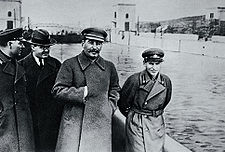- Nonperson
-
A nonperson is a citizen or a member of a group who lacks, loses, or is forcibly denied social or legal status, especially basic human rights, or who effectively ceases to have a record of their existence within a society (damnatio memoriae), from a point of view of traceability, documentation, or existence. The term also refers to people whose death is unverifiable and about which inquiries result in a "blank wall" of "nobody knows". The phrase was coined by George Orwell in his dystopian novel, Nineteen Eighty-four.
Contents
Ways to become nonpersons
A Soviet "nonperson" vanishes: commissar Nikolai Yezhov retouched after falling from favor and being executed in 1940.Some common ways in which people become nonpersons are:
- Never having been sufficiently documented as existing
- Loss or deletion of the trail of documentation so that the specific person can no longer easily be linked to a documentary record or cannot be shown officially to have existed
- Covert abduction by government or other bodies combined with plausible deniability
- Long-term absence or other circumstances leading to an incorrect belief and legal documentation that they have died
- Death, when it is unverifiable and left as an open case as to what happened
- Fraudulent reporting of a person as having died when they have not (which can happen for economic reasons in India and other countries, a form of fraud)
- Marginalized or homeless people who live without cash or formal abode and do not appear on official records
Legal status
Asserting that someone is a nonperson is implicitly a normative statement; by doing so, it is implied simultaneously that the person referred to is entitled to the rights that any person should have. Who is a person and what every person is entitled to depends on context and social norms. For example, wards that are under the authority of a legal guardian due to infancy, incapacity, or disability are not usually considered nonpersons.
Examples
There are many possible meanings associated with the term nonperson.
Prison camps
In Nazi extermination camps, Jewish people, Roma, homosexuals, and individual political prisoners were treated as nonpersons. The purpose of these camps was to systematically dehumanise these "unwanted elements", use them where possible, and dispose of them efficiently. "Nonperson" status was required because it removed the moral and social obstacles for committing otherwise objectionable acts of violence, crime, abuse, and murder.
Unofficially missing people
Main article: Forced disappearanceSome people are covertly held by governments or other bodies, and effectively cease to exist. This has happened in dictatorial regimes such as Chile under Pinochet, the USSR, and fascist Spain. To dodge pointed questions regarding supposedly democratically controlled governments covertly holding people or employing torture, plausible deniability of knowledge might be used. The existence of ghost detainees in a secret CIA prison system is an example of this.
To an extent, this is made both easier and harder by technology – easier because reliance upon technology is such that if a person's information is electronically deleted or was never stored in that manner they effectively cease to exist; harder because during every stage of a person's life from birth to death the accumulation of bureaucratic transactions makes it more and more likely that they will leave an official record somewhere.
Industrialized countries
A person that does not appear on any official documents, is economically or socially inactive, or lives outside of what is defined as the "productive system" or "organized society" could be classified as a nonperson. This is often the case of homeless and marginalized people in general.[citation needed]
Also, some legally detained prisoners can be considered to be in a quasi-nonperson status, temporarily or indefinitely, to different extents depending on the reasons for and conditions of their detention. For example, in most countries, ordinary prisoners are denied political rights such as voting; in the most severe cases, total or partial isolation from the outside world can be inflicted.
Demonization
A "nonperson" status can also be consciously or unconsciously applied to unwanted persons (demonization) by their surrounding society. This can be extended and applied to an entire nation or ethnic group, as often happens in wars or other conflicts.
This was the situation in the Nazi state with regard to Jews, and in most societies with regard to gypsies, and it is often applied in times of war to the entire enemy nation; its people are stripped of their "person status" and demonized, making them appear to be monsters (not humans), and thus indirectly rationalizing any excess or abuse committed against them. Similar cases, concerning contra-revolutionaries, are found in most socialist states.
It can be argued that the "nonperson" status, apart from the German deathcamps, can be found in its most literal form when considering certain prisoners of war, especially if they are or are considered to be illegal combatants. An example is the Guantanamo bay prison in which several people have been held without public precise charges being brought against them, are denied any form of access to the outside world (and vice versa), and are in an unclear and controversial legal status.
In fantasy and fiction
Nonpersons are described in George Orwell's Nineteen Eighty-Four as people who were erased from existence by alteration of records. The Newspeak word for such a person was unperson.
In the real-time strategy game Red Alert 2, Yuri names General Vladimir as a nonperson, and orders the player to apprehend him.
In the novel The Smallest Island, several immortal mermaids are declared nonpersons because they lack sufficient documentation of ever having existed or because the records they have do not corroborate their physical ages.
See also
Categories:- Human rights abuses
- Historical deletion
Wikimedia Foundation. 2010.


